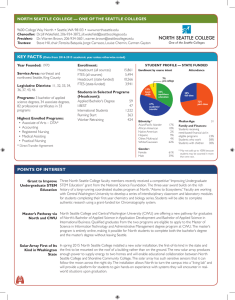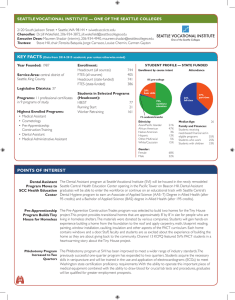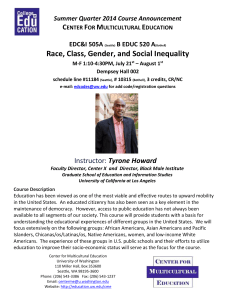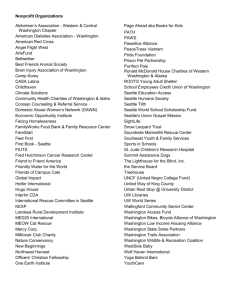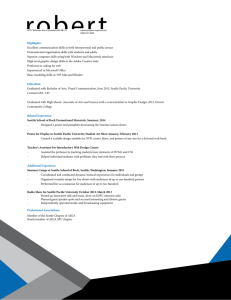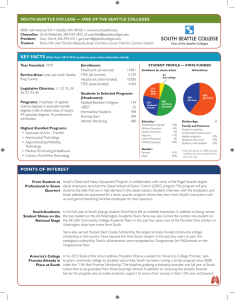SEATTLE CENTRAL COLLEGE — ONE OF THE SEATTLE COLLEGES
advertisement
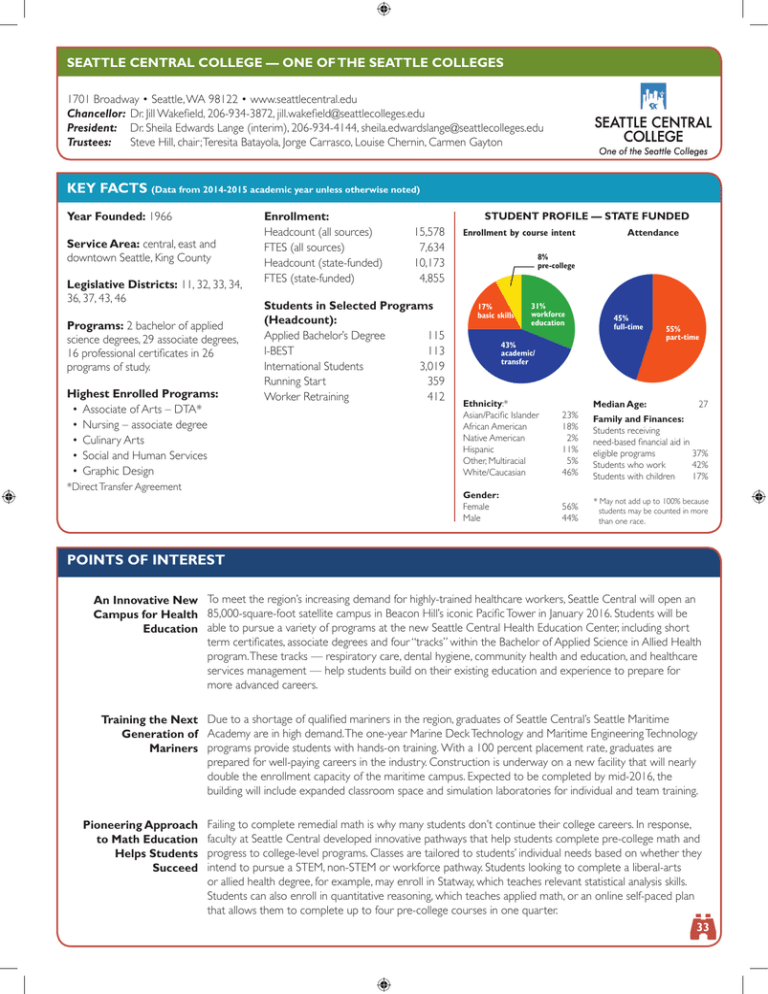
SEATTLE CENTRAL COLLEGE — ONE OF THE SEATTLE COLLEGES 1701 Broadway • Seattle, WA 98122 • www.seattlecentral.edu Chancellor: Dr. Jill Wakefield, 206-934-3872, jill.wakefield@seattlecolleges.edu President: Dr. Sheila Edwards Lange (interim), 206-934-4144, sheila.edwardslange@seattlecolleges.edu Trustees: Steve Hill, chair; Teresita Batayola, Jorge Carrasco, Louise Chernin, Carmen Gayton KEY FACTS (Data from 2014-2015 academic year unless otherwise noted) Year Founded: 1966 Service Area: central, east and downtown Seattle, King County Legislative Districts: 11, 32, 33, 34, 36, 37, 43, 46 Programs: 2 bachelor of applied science degrees, 29 associate degrees, 16 professional certificates in 26 programs of study. Highest Enrolled Programs: • Associate of Arts – DTA* • Nursing – associate degree • Culinary Arts • Social and Human Services • Graphic Design *Direct Transfer Agreement Enrollment: Headcount (all sources) FTES (all sources) Headcount (state-funded) FTES (state-funded) 15,578 7,634 10,173 4,855 Students in Selected Programs (Headcount): Applied Bachelor’s Degree 115 I-BEST113 International Students 3,019 Running Start 359 Worker Retraining 412 STUDENT PROFILE — STATE FUNDED Enrollment by course intent Attendance 31+44+178 55+45 8% pre-college 17% basic skills 31% workforce education 43% academic/ transfer Ethnicity:* Asian/Pacific Islander 23% African American 18% Native American 2% Hispanic11% Other, Multiracial 5% White/Caucasian46% Gender: Female56% Male44% 45% full-time 55% part-time Median Age:27 Family and Finances: Students receiving need-based financial aid in eligible programs 37% Students who work 42% Students with children 17% * May not add up to 100% because students may be counted in more than one race. POINTS OF INTEREST An Innovative New To meet the region’s increasing demand for highly-trained healthcare workers, Seattle Central will open an Campus for Health 85,000-square-foot satellite campus in Beacon Hill’s iconic Pacific Tower in January 2016. Students will be Education able to pursue a variety of programs at the new Seattle Central Health Education Center, including short term certificates, associate degrees and four “tracks” within the Bachelor of Applied Science in Allied Health program. These tracks — respiratory care, dental hygiene, community health and education, and healthcare services management — help students build on their existing education and experience to prepare for more advanced careers. Training the Next Due to a shortage of qualified mariners in the region, graduates of Seattle Central’s Seattle Maritime Generation of Academy are in high demand. The one-year Marine Deck Technology and Maritime Engineering Technology Mariners programs provide students with hands-on training. With a 100 percent placement rate, graduates are prepared for well-paying careers in the industry. Construction is underway on a new facility that will nearly double the enrollment capacity of the maritime campus. Expected to be completed by mid-2016, the building will include expanded classroom space and simulation laboratories for individual and team training. Pioneering Approach to Math Education Helps Students Succeed Failing to complete remedial math is why many students don’t continue their college careers. In response, faculty at Seattle Central developed innovative pathways that help students complete pre-college math and progress to college-level programs. Classes are tailored to students’ individual needs based on whether they intend to pursue a STEM, non-STEM or workforce pathway. Students looking to complete a liberal-arts or allied health degree, for example, may enroll in Statway, which teaches relevant statistical analysis skills. Students can also enroll in quantitative reasoning, which teaches applied math, or an online self-paced plan that allows them to complete up to four pre-college courses in one quarter. 33
